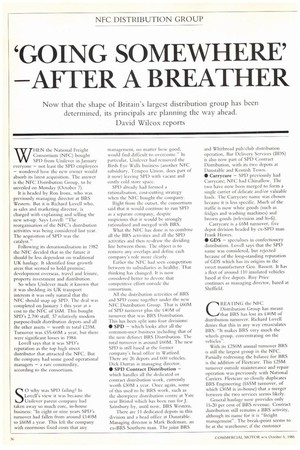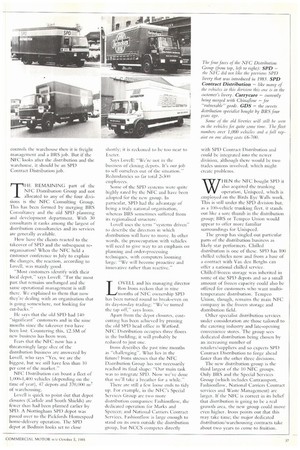'GOING SOMEWHERE' AFTER A BREATHER
Page 38

Page 39

If you've noticed an error in this article please click here to report it so we can fix it.
Now that the shape of Britain's largest distribution group has been determined, its principals are planning the way ahead.
David Wilcox reports
WIIEN the National Freight Consortium (NFC) bought SPD from Unilever in January everyone — not least the SPD employees — wondered how the new owner would absorb its latest acquisition. The answer is the NEC Distrihuticm Group, to be unveiled on Monday (October 7).
It is headed by Ron Irons, who was previously managing director at 13RS Western. But it is Richard Lovell who, as sales and marketing director, is charged with explaining and selling the new set-up. Says Lovell: "The reorganisation of the NFC's distribution activities was being considered last year. The acquisition of SPD was the catalyst."
Following its denationalisation in 1982 the NFC decided that in the future it should be less dependent on traditional UK haulage. It identified four growth areas that seemed to hold promise; development overseas, travel and leisure, property investment and distribution.
So when Unilever made it known that it was shedding its UK transport interests it was only natural that the NFC should snap up SPD. The deal was completed on January 1 this year at a cost to the NEC of 8:6M. This bought SPD's 2,700 staff, 37 relatively modern purpose-built distribution depots and all the other assets — worth in total i:23M. Turnover was £55-60M a year, hut there were significant losses in 1984.
Lovell says that it was SPD's reputation as the top high street distributor that attracted the NEC. But the company had some good operational managers — a rare commodity, according to the consortium.
SO why was SPD failing? In Lovell's view it was because the Unilever parent company had taken away so much core, in-house business: "In eight or nine years SPD's turnover had fallen from around 1:140M to £60M a year. This left the company with enormous fixed costs that any
management, no matter how good, would find difficult to overcome." In particular, Unilever had removed the Birds Eye Walls business (another NFC subsidiary, Tempco Union, does part of it now) leaving SPD with vacant and costly cold store space.
SPD already had formed a rationalisation, cost-cutting strategy when the NFC bought the company.
Right from the outset, the consortium said that it would continue to run SPD as a separate company, despite suspicions that it would be strongly rationalised and merged with BRS.
What the NFC has done is to combine all the BRS activities and all the SPD activities and then re-draw the dividing line between them. The object is to remove any overlaps and define each company's role more clearly.
Earlier the NFC had seen competition between its subsidiaries as healthy. That thinking has changed. It is now considered better to devote that competitive effort outside the consortium.
All the distribution activities of BRS and SPD come together under the new NFC Distribution Group. That is C60M of SPD turnover plus the i40M of turnover that was BRS Distribution. This has been split into four divisions: • SPD — which looks after all the common-user business including that of the now defunct BRS Distribution. The total turnover is around i:60M. The new SPD is still based at the former company's head office in Watford. There are 26 depots and 600 vehicles. Dick Durran is managing director.
• SPD Contract Distribution — which handles all the dedicated or contract distribution work, currently worth £30M a year. Once again, some of this used to be BRS work, such as the showpiece distribution centre at Yate near Bristol which has been run for J. Sainsbury by, until now, BRS Western.
There are 11 dedicated depots in this division and a head office at Dunstable. Managing director is Mark Bedeman, an ex-BRS Southern man. The joint BRS and Whitbread pub/club distribution operation, Bar Delivery Services (BDS) is also now part of SPD Contract Distribution, with its two depots at Dunstable and Kentish Town.
• Carrycare — SPD previously had Carrycare; NFC had Chinaflow. The two have now been merged to form a single carrier of delicate and/or valuable loads. The Carrycare name was chosen because it is less specific. Much of the traffic is now white goods (such as fridges and washing machines) and brown goods (television and hi-fl).
Carrycare is a i:fiM turnover, five depot division headed by ex-SPD man Frank Hawes.
• GDS — specialises in confectionery distribution. Lovell says that the SPD name was considered, but rejected because of the long-standing reputation of GDS which has its origins in the sweet manufacturer Geo. Bassett. It has a fleet of around 110 insulated vehicles based at five depots. Roy Price continues as managing director, based at Sheffield.
CRFATING the (\WC CRFATING the (\WC
Distribution Group has meant that BRS has lost its £40M of distribution turnover. Richard Lovell denies that this in any way emasculates BRS: "It makes BRS very much the wheels group, concentrating on the vehicles".
With its £250M annual turnover BRS is still the largest group in the NFC. Partially redressing the balance for BRS is the addition of Fleetcare. This A:25M turnover outside maintenance and repair operation was previously with National Carriers. Fleetcarc so closely duplicates BRS Engineering (i.65M turnover, of which i:30M is in-house) that a merger between the two services seems likely.
General haulage now provides only 15-20 per cent of BRS revenue. Contract distribution still remains a BRS activity, although its name for it is "freight management". The break-point seems to be at the warehouse; if the customer controls the warehouse then it is freight management and a BRS job. But if the NFC looks after the distribution and the warehouse, it should be an SPD Contract Distribution job.
THE REMAINING part of the NFC Distribution Group and not allocated to any of the four divisions is the NFC Consulting Group. This has been formed by merging BRS Consultancy and the old SPD planning and development department. With 30 consultants it ranks among the largest of distribution consultancies and its services are generally available.
How have the clients reacted to the takeover of SPD and the subsequent reorganisation? When the NFC held a customer conference in July to explain the changes, the reaction, according to Lovell, was mainly good.
"Most customers identify with their local depot," says Lovell. "For the most part that remains unchanged and the same operational management is still there. We explained to them that now they're dealing with an organisation that is going somewhere, not looking for cut-backs."
He says that the old SPD had 140 "significant" customers and in the nine months since the takeover two have been lost. Countering this, £2.5M of new business has been won.
Fears that the NFC now has a threateningly large slice of the distribution business are answered by Lovell, who says "Yes, we are the biggest, but we still have less than 10 per cent of the market."
NFC Distribution can boast a fleet of 1,000-1,400 vehicles (depending on the time of year). 47 depots and 370,000 m2 of warehousing.
Lovell is quick to point out that depot closures (Carlisle and South Shields) are fewer than had been planned earlier by SPD. A Nottingham SPD depot was passed over to the Pickfiirds Homespeed home-delivery operation. The SPD depot at Bodmin looks set to close shortly; it is reckoned to be too near to Exeter.
Says Lovell: "We're not in the business of closing depots. It's our job to sell ourselves out of the situation." Redundancies so far total 2-300 employees.
Sonic of the SPD systems were quite highly rated by the NFC and have been adopted for the new group. In particular, SPD had the advantage of being a truly national organisation, whereas BRS sometimes suffered from its regionalised structure.
Lovell uses the term "systems driven" to describe the direction in which distribution will have to move. In other words, the preoccupation with vehicles will need to give way to an emphasis on planning and order-processing techniques, with computers looming large: "We will become proactive and innovative rather than reactive."
L()V ELL and his managing director Ron Irons reckon that in nine months of NFC ownership SPD has been turned round to break-even on its day-to-day trading: "We've turned the tap off," says Irons.
Apart from the depot closures, costcutting has been achieved by pruning the old SPD head office in Watford. NFC Distribution occupies three floors in the building; it will probably be reduced to just one.
Irons describes the past nine months as "challenging". What lies in the future? Irons stresses that the NFC Distribution Group has not necessarily reached its final shape: "Our main task was to integrate SPD. Now we've done that we'll take a breather for a while."
There are still a few loose ends to tidy up. For example, in the NI-C's Special Services Group are two more distribution companies: Fashionflow, the dedicated operation for Marks and Spencer; and National Carriers Contract Services. Fashiontlow is large enough to stand on its own outside the distribution group, but NCCS competes directly with SPD Contract Distribution and could be integrated into the newer division, although there would be two trades unions involved, which might Create problems.
WHEN the NFC bought SPD it also acquired the trunking operation, Unispeed, which is employed on the Birds Eye Walls work. This is still under the SPD division but, as a 100-vehicle trunking fleet, it stands out like a sore thumb in the distribution group; BRS or Tempco Union would appear to offer more familiar surroundings for Unispeed.
The group has singled out particular parts of the distribution business as likely star performers. Chilled distribution is one of these. SPD has 100 chilled vehicles now and from a base of a contract with Van den Berghs can offer a national chilled service. Chilled/frozen storage was inherited in sonic of the SPD depots and so a small amount of frozen capacity could also be offered for customers who want multitemperature distribution. Tempe° Union, though, remains the main NFC company in the frozen storage and distribution field.
Other specialist distribution services under consideration are those tailored to the catering industry and late-opening convenience stores. The group sees dedicated distribution being chosen by an increasing number of retailers/suppliers and so expects SPD Contract Distribution to forge ahead faster than the other three divisions.
The new distribution group is the third largest of the 10 NFC groups. Only BRS and the Special Services Group (which includes Cartransport, Fashionflow, National Carriers Contract services and Waste Management) are larger. If the NFC is correct in its belief that distribution is going to be a real growth area, the new group could move even higher. Irons points out that this may take time; the major dedicated distribution/warehousing contracts take about two years to come to fruition.












































































































